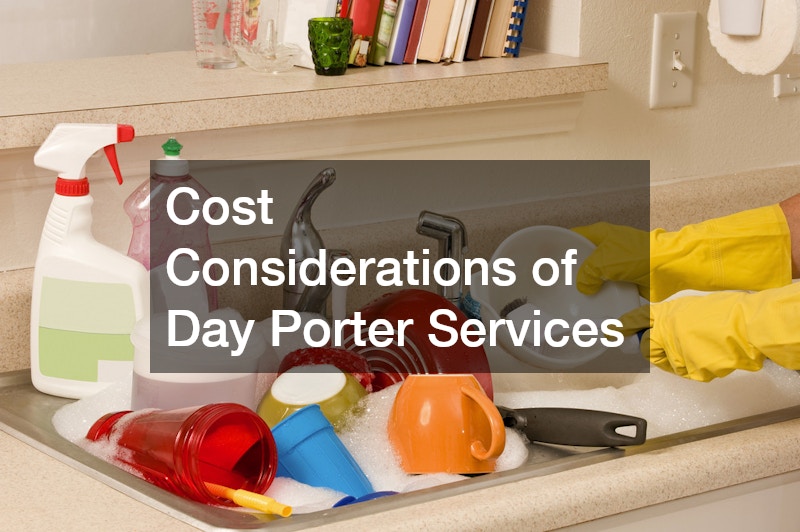In today’s fast-paced business world, maintaining a clean, organized, and efficient environment is more crucial than ever, and commercial day porter services are stepping up to meet this demand. These services provide businesses with continuous support throughout the business day, enhancing the overall operational efficiency and customer experience.
The increasing popularity of day porter services highlights their value in various sectors, from retail to corporate offices. As more businesses recognize the importance of maintaining a spotless and welcoming atmosphere, the demand for dedicated day porters continues to rise.
Understanding what day porter services entail and their potential impact on your business is essential before making an informed decision. This article will delve into the various aspects of commercial day porter services, helping you understand how they differ from standard cleaning services and the benefits they offer.
What is a Commercial Day Porter Service?
Definition and Overview
A commercial day porter service involves deploying staff to handle and oversee various tasks in a business environment continuously throughout the day. Unlike traditional cleaning services, day porters are present during business hours, ensuring the premises remain clean and well-organized at all times.
Day porters play a crucial role in maintaining the appearance and functionality of shared spaces, such as lobbies, restrooms, and break rooms. Their presence ensures that any issues are addressed promptly, minimizing disruptions to employees and customers.
Key Differences from Regular Cleaning Services
One of the critical differences between day porter services and regular cleaning services is the continuous presence and support offered during business hours. Regular cleaning crews typically work after hours or during off-peak times, whereas day porters are available to address immediate needs as they arise.
This continuous support can significantly impact the day-to-day operations of a business, creating a seamless and uninterrupted flow of activities. By proactively addressing issues, day porters help prevent small problems from escalating into larger ones.
Benefits of Hiring a Day Porter Service
Enhanced Customer Experience
A clean and organized business environment significantly enhances the customer experience, contributing to higher satisfaction and loyalty. Day porters ensure that public areas are always presentable, making a lasting positive impression on visitors.
Customers are more likely to return to businesses that maintain a high standard of cleanliness, influencing their overall perceptions. By creating a welcoming atmosphere, businesses can differentiate themselves from competitors.
Increased Employee Productivity
The presence of day porters positively impacts employee productivity by ensuring a tidy and well-maintained workplace. A clean environment helps to reduce distractions and fosters a more focused and motivated workforce.
Employees can concentrate on their tasks without being sidetracked by unsightly or unkempt areas within the office. This improved focus directly contributes to productivity and efficiency, benefiting the company as a whole.
What Tasks Do Day Porters Perform?
Daily Maintenance Activities
Day porters are responsible for a variety of daily maintenance activities, which include tasks such as restroom upkeep, trash removal, and lobby maintenance. These routine activities ensure that the business environment remains clean and inviting throughout the day.
Keeping restrooms fully stocked and clean is a top priority for day porters, as these areas significantly impact customer and employee satisfaction. Their continual presence enables them to address any immediate cleaning needs as they arise.
On-Demand and Special Tasks
In addition to daily tasks, day porters handle on-demand and special tasks as needed. This includes setting up meeting rooms, managing event spaces, or tackling urgent cleaning requests to ensure smooth operations.
The flexibility to perform diverse tasks allows day porters to adapt to the dynamic needs of a business environment. Their ability to efficiently respond to unexpected situations keeps the business running smoothly, regardless of daily challenges.
How to Choose the Right Day Porter Service for Your Business
Assessing Business Needs
Before choosing a day porter service, it’s crucial to assess your business’s specific needs. Evaluating factors such as the size of the premises, foot traffic, and unique operational challenges will help determine the appropriate level of day porter service required.
This assessment allows businesses to tailor day porter services to their unique requirements, ensuring maximum effectiveness. By understanding their specific needs, businesses can communicate expectations clearly to potential service providers.
Evaluating Potential Providers
Once business needs are identified, evaluating potential day porter service providers is the next step. Important criteria include the provider’s experience, reputation, and customer reviews, all of which offer insights into their reliability and effectiveness.
Thorough research and comparisons between providers enable businesses to select a partner aligned with their values and goals. A well-chosen service provider can significantly elevate the quality of facility maintenance.
Cost Considerations of Day Porter Services
Factors Affecting Cost
The cost of hiring a day porter service is influenced by factors such as the level of service required, the size of the facility, and the frequency of tasks performed. Businesses must consider these elements when budgeting for a day porter service.
Additional factors that may affect cost include the complexity of tasks and any special requirements specific to the business. A transparent understanding of these factors helps in negotiating a fair and accurate service agreement with providers.
Budgeting for Day Porter Services
Effective budgeting for day porter services involves conducting a cost-benefit analysis to ensure the investment aligns with business objectives. By calculating potential returns, businesses can make informed decisions on the scope of services to implement.
Businesses should allocate budgets based on their specific needs and operational constraints, ensuring the service offers tangible value without exceeding budget limitations. Clear communication with service providers allows for flexible budgeting options tailored to business requirements.
.




